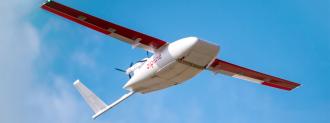To speed up coronavirus testing, the African nation of Ghana is using autonomous drones to transport test samples from rural areas to two city labs.
Prior to the launch of the drone program, health officials in Accra and Kumasi would wait for hours or even days for delivery trucks to visit rural medical facilities, collect batches of test samples, and then deliver them for analysis.
The delivery time is now far shorter — in some cases, less than an hour.
How to Speed Up Coronavirus Testing
In April 2019, U.S.-based startup Zipline launched a drone-delivery service in Ghana, using its fleet of fixed-wing drones to transport blood, vaccines, and other medical supplies to remote areas.
One year later, on April 17, it officially launched a delivery service to speed up coronavirus testing.
Through this service, Zipline collects samples from more than 1,000 rural hospitals at its existing distribution centers and packages them according to World Health Organization guidelines.
Using contactless drone delivery to transport COVID-19 test samples will allow the government to respond to the pandemic and help save lives more quickly.
Keller Rinaudo
Its drones then fly the samples to either Accra’s Noguchi Memorial Institute for Medical Research or the Kumasi Center for Collaborative Research.
The packages containing the samples are then dropped via parachute to waiting medical staff.
The first day of the service, Zipline drones made four flights, each more than 70 miles roundtrip, to deliver 51 coronavirus test samples to Accra.
The following day, it began delivering samples to Kumasi, a 60-mile roundtrip flight, and it plans to continue the deliveries for the duration of the COVID-19 outbreak.
This approach allows Ghana to speed up coronavirus testing, as it no longer needs to wait for batches of samples to arrive via truck — as soon as samples arrive at one of Zipline’s distribution centers, the company can pack them up and send them off to one of the nation’s major cities for analysis.
The use of drones also eliminates potential contact between truck drivers and the coronavirus.
“Zipline is dedicated to helping Ghana in its fight against the COVID-19 pandemic,” CEO Keller Rinaudo said in a statement, according to Axios. “Using contactless drone delivery to transport COVID-19 test samples will allow the government to respond to the pandemic and help save lives more quickly.”
Zipline Drones in the U.S.
Zipline hopes to soon use its drones to speed up coronavirus testing in the United States, too.
The company already planned to launch in the U.S. in Fall 2020, but according to Axios, it is now talking to the Federal Aviation Administration (FAA) about beginning “emergency humanitarian operations” as soon as possible.
Rather than directly transporting test samples, the company would focus its U.S.-based efforts on helping quickly and effectively distribute test kits and other coronavirus supplies anywhere they’re needed.
Its drones could also potentially stem the spread of COVID-19 in the U.S. by delivering medicines and diagnostic tools directly to the home of people with chronic illnesses.
This would save those patients from having to visit a hospital, where they might catch the coronavirus, Justin Hamilton, Zipline’s global head of communications, told Fast Company.
If given the go-ahead from the FAA, Zipline believes its drones could be ready for action in the U.S. within a couple of weeks — but in the interim, the company will continue to focus on helping speed up coronavirus testing in Ghana.






